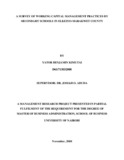| dc.description.abstract | The study sought to establish the working capital management practices employed by secondary schools in Elkeiyo-Marakwet County. The research design used was the descriptive survey. The sample size consisted of all the 79 secondary schools in the county. Data was collected using semi-structured questionnaire which was divided into four sections: section on the type and category of the school, section on each of the following; cash management practices, debtors management practices, inventory and credit management practices. These questionnaires were administered through individual visits to the respondent schools. These instruments were validated using the results of the pilot study .. The data collected was analysed using the Statistical Package for Social Sciences (SPSS). The results were quantified using tables showing frequencies' and percentages to facilitate easy understanding. Factor analysis was also employed.
The findings revealed that the head teachers exercised complete control of most of the decisions relating to working capital. The study also found out that most schools do not have any policy on amount of cash to hold at a particular time. Cash collection was mainly banked on a weekly basis. As expected, the study found out that the major source of school funds was fees and that schools prepared a cash budget on a yearly basis.
On the issue of receivables, the study found out that most schools expect fees to be paid at beginning of the term. Most schools did not establish the creditworthiness of their students before admission and that they always remind students of overdue fees after thirty days through a letter to the parent and in extreme situations, the student is sent home. The responsibility of collecting the outstanding debts was on the head teacher.
The study also revealed that most schools do have an inventory policy. The factors that most schools indicated as the determining the inventory to hold was its usage and availability of funds. Inventory control models were not used in the schools.
The study also found out that majority of the schools purchased goods on credit and took advantage of cash discounts. All the schools interviewed reported not taking any short term loans.
The major challenge facing the schools studied is collection of overdue debts. The schools admitted that there is no way they can force the government to release the FSE funds and that apart from reminding students of outstanding fees and sometimes sending them home, there are no legal procedures that can be taken to recover the fees from students especially in the public schools.
On policy recommendations, the study suggests separation of school administration from financial management and that the qualified persons on financial matters are employed. Procedures should also be put in place to facilitate debt collection and avenues for investing idle cash for maximum returns should be established. | en_US |

